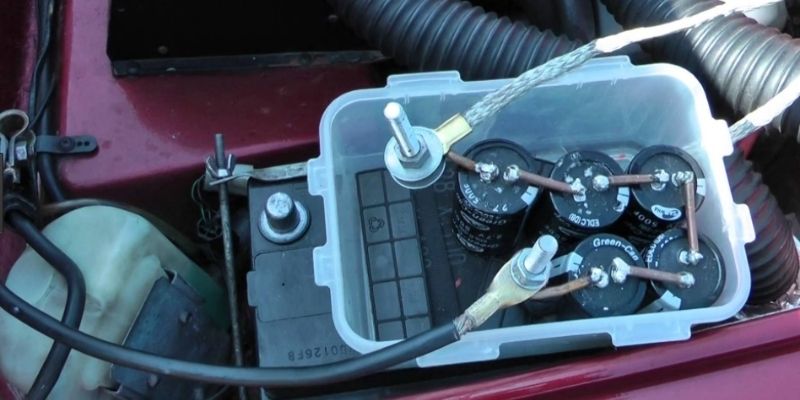Different Types Of Electrolyte For A Supercapacitor Batteries
Have you ever heard of supercapacitor batteries? You might be knowing about capacitors, their manufacturing, their applications, and much more. What about these supercapacitor batteries? What are these supercapacitor batteries? How are they manufactured?
It is crucial to know everything regarding the supercapacitor before you know about supercapacitor batteries. Besides this, it is necessary to understand the different electrolytes used in the making of supercapacitor batteries.
What Do We Mean By A Supercapacitor?
Supercapacitors are also popularly known as ultracapacitors. They are a kind of capacitors that offer the highest capacitance. Moreover, they have low limits on the voltage. The capacitance of the capacitor is the value that will help bridge the gap between the electrolytic capacitors and batteries. In a supercapacitor, you will find 100 times more energy as compared to the regular capacitors. Supercapacitors are efficient in delivering as well as receiving huge charges. Moreover, the supercapacitors have the power to endure a higher number of charge-discharge cycles.
The plates of the supercapacitors are manufactured from metallic substances and get dipped in electrolytes. These plates are kept separated by a thin layer of insulation. Due to this thin layer of insulation, a double layer gets formed by the supercapacitors. In both the layers of the capacitor, the electric charges are opposite. Because of the difference in charge, the supercapacitors have high capacitance. A battery has a limited lifespan, whereas a supercapacitor will have an unlimited lifespan. The exceptionally long lifespan is due to the higher capacitance. Moreover, the energy density is also high.
What Are the Different Types Of Electrolytes Used In Supercapacitor Batteries?
Choosing the right electrolyte for supercapacitors is essential because it will have a great impact on its overall performance. The stability offered by the electrolyte will decide the system voltage and its applied potential. Besides, the type of electrolyte used in the supercapacitors will ensure the energy density of the batteries. Many other aspects are dependent on the type of electrolyte used — conductivity, power density, and breakdown voltage. If you are using the electrolytes in the supercapacitors, the electrolyte should impart high power and energy density.
Currently, three premium electrolytes are applicable in the manufacturing of supercapacitor batteries. These electrolytes are aqueous electrolytes, organic electrolytes, and ionic liquids.
Aqueous Electrolytes For Supercapacitor Batteries:
The aqueous electrolytes get classified into acidic, alkaline, and neutral solution categories.
Acidic — H2SO4
Alkaline — KOH
Neutral — Li2SO4, Na2SO4, or KCl
The aqueous electrolytes used in supercapacitors impart iconic concentration with low resistance. With a lower resistance, the supercapacitors made from aqueous electrolyte solutions are highly powerful and possess higher capacitance. Supercapacitor batteries do not require tight production procedures. You can prepare them easily.
If you are using an aqueous electrolyte for the supercapacitor batteries, then the voltage window will be extremely low. Due to this, the overall energy and densities will be limited. The chances of improving the energy densities in the later stage will not be possible.
Organic Electrolytes For Supercapacitor Batteries:
With organic electrolytes, you can increase the voltage window of the supercapacitor batteries. The chemical experts usually recommend using supercapacitor batteries designed from organic electrolytes. It will improve the higher density of the energy used in the batteries. The most commonly used organic electrolyte is propylene carbonate (PC). The demand for PC is because it has a wide window for voltage. Moreover, PC is exceptionally environment-friendly. Due to the high window, you can increase the conductivity of the supercapacitor batteries.
With organic supercapacitor batteries, you need to ensure that the electrolyte solution is purified regularly. If impurities keep increasing, it will raise the toxicity of the batteries. It will reduce the conductivity of the batteries and their capacitance.
Ionic Liquids As Electrolytes In Supercapacitor Batteries:
Ionic liquids are popularly known as molten salts. The molten salts have desirable properties that should be available in the electrolyte. The ionic liquids have immensely high thermal conductivity and stability that makes the supercapacitor batteries better than others. The ionic liquids will have high viscosity that will improve the capacitance of the supercapacitor batteries and reduce resistance.
Summary:
The chemical industry is experiencing steady growth. All this is due to technological innovations and advancement. Supercapacitor batteries are a type of capacitor that possess more energy and power than other capacitors. Thus, you will find these capacitor batteries to be experience and rare. You can find a wide range of chemicals at Tatvachintan. You can visit their website to know the different types of chemicals you will get meant for the chemical industry.






Comments
Post a Comment